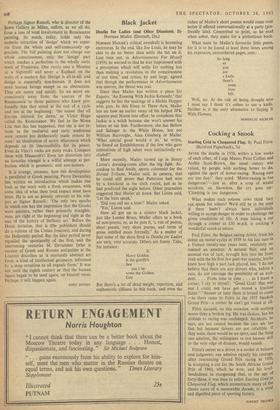Cocking a Snook
Starting Grid to Chequered Flag. By Paul Frere. (Batsford Paperbacks, 5s)
AFTER the deaths in 1958, within a few weeks of each other, of Luigi Musso, Peter Collins and Archie Scott-Brown, the usual outcry was raised, by people with nothing better to do, against the sport of motor-racing. 'Racing cars arc too fast !' they cried. 'Motor-racing is too dangerous!'—just as, after a crop of winter accidents on Snowdon, the cry goes up: 'Climbing is too dangerous.'
What makes such solemn cows think they can speak for others? We'd still be in the trees if there hadn't always been individuals willing to accept danger in order to challenge the given conditions of life. A man taking a car through a corner at 150 m.p.h. is cocking a wonderful snook at nature.
Paul Frere, the Belgian racing driver, from his debut on motor-cycles in 1939 to his last race in a Ferrari twenty-one years later, resolutely re- mained an amateur. A natural flair, and an unusual run of luck, brought him into the front rank with the his first few post-war seasons; but he knew how high a part luck played, too. 'I do not believe that there are any drivers who, before a race, do not envisage the possibility of an acci- dent. . . . From time to time . . . as I leave a corner, I say to myself : "Good God! that was one I could not have got round a fraction faster." ' Sooner or later there is bound to come —as there came to Frere in the 1955 Swedish Grand Prix—a corner he can't get round at all.
Frere escaped, on this occasion, with nothing worse than a broken leg. He was shaken, but his attitude to racing was unchanged. Accidents, he says, are not caused because the cars are too fast but because drivers are not infallible. If they were, there would be no sport, and the thing one admires, the willingness to test human skill to the very edge of disaster, would vanish.
Frere's career as a driver is a model of balance and judgment; one admires equally his courage, after renouncing Grand Prix racing in 1956, in accepting a car for the South African Grand Prix of 1960, which he won; and his level- headedness in recognising that, at the age of forty-three, it was time to retire. Starting Grid to Chequered Flag, which reconstructs many of the classic races of a memorable decade, is a vivid and dignified piece of sporting history.
JEREMY BROOKS














































 Previous page
Previous page